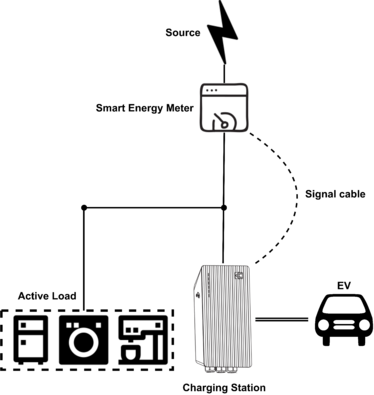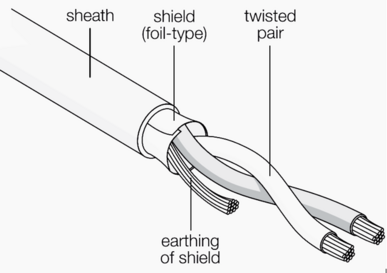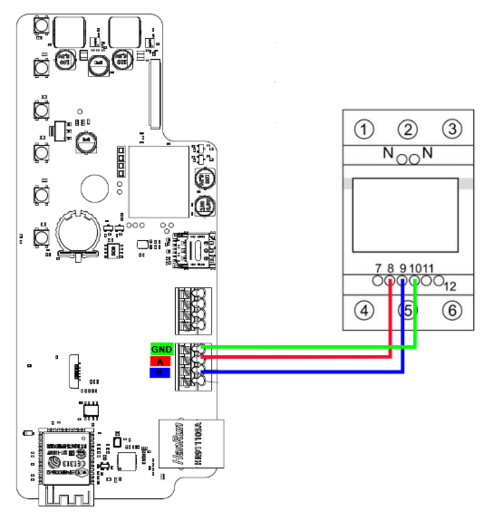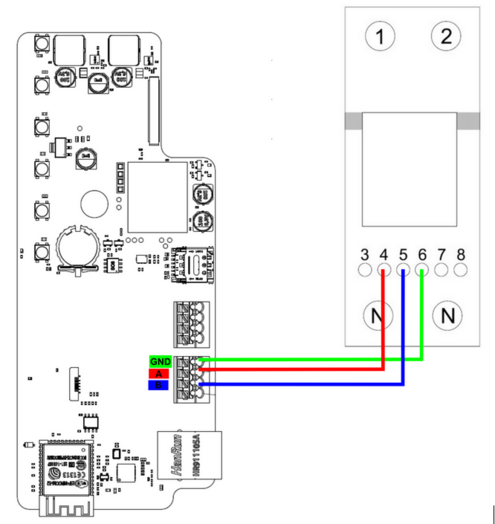Difference between revisions of "Dynamic Load Balancing"
| Line 1: | Line 1: | ||
| + | === '''DYNAMIC LOAD BALANCING''' === | ||
| + | TeltoCharge have the ability to communicate with dedicated smart energy meter and regarding to its readings, adjust used electrical power. Such functionality allows to protect house electrical grid from overload in peak hours and optimize energy usage to meet user habits. Smart energy meter should always be installed in source electrical cabinet as showed below. | ||
| + | [[File:Dynamic Load Balancing Conection Schematic.png|alt=|center|frameless|395x395px]] | ||
| − | ''' | + | ==== '''Smart meter and TeltoCharge communication''' ==== |
| − | + | Smart meter and TeltoCharge communicates via Modbus RS-485 protocol. In order to achieve smooth communication, it is recommended to use communication cable according to this protocol. Check example below | |
| − | [[File: | + | [[File:TeltoCharge DLB CableExample.png|center|frameless|387x387px]] |
| + | |||
| + | ==== '''Supported Energy Meters''' ==== | ||
| + | In order to strive for wider applicability and compatibility, we constantly test and add new supported devices into list. All of the supported Energy meters and schematics how to connect them are provided bellow. | ||
| + | |||
| + | Note: All of the Color-coding is strictly exemplary and is used simply to differentiate between different connection points. Different communication cables can have differently coloured wires. Connect them according to used inventory. | ||
| + | |||
| + | === Carlo Gavazzi meters: === | ||
| + | |||
| + | ==== EM 3rd series to TeltoCharge connection ==== | ||
| + | [[File:TeltoCharge DLB CarloGavazzi 3phase.png|center|frameless|521x521px]] | ||
| + | |||
| + | ==== EM 1st series to TeltoCharge connection ==== | ||
| + | [[File:TeltoCharge DLB CarloGavazzi 1phase.png|center|frameless|524x524px]] | ||
| + | |||
| + | ==== Powering the Energy Meter ==== | ||
| + | To correctly connect smart energy meter to power source, it is recommended to use manufacturers installation manuals. | ||
Revision as of 07:00, 1 July 2022
Main Page > TeltoCharge > Advanced Topics > Dynamic Load BalancingDYNAMIC LOAD BALANCING
TeltoCharge have the ability to communicate with dedicated smart energy meter and regarding to its readings, adjust used electrical power. Such functionality allows to protect house electrical grid from overload in peak hours and optimize energy usage to meet user habits. Smart energy meter should always be installed in source electrical cabinet as showed below.
Smart meter and TeltoCharge communication
Smart meter and TeltoCharge communicates via Modbus RS-485 protocol. In order to achieve smooth communication, it is recommended to use communication cable according to this protocol. Check example below
Supported Energy Meters
In order to strive for wider applicability and compatibility, we constantly test and add new supported devices into list. All of the supported Energy meters and schematics how to connect them are provided bellow.
Note: All of the Color-coding is strictly exemplary and is used simply to differentiate between different connection points. Different communication cables can have differently coloured wires. Connect them according to used inventory.
Carlo Gavazzi meters:
EM 3rd series to TeltoCharge connection
EM 1st series to TeltoCharge connection
Powering the Energy Meter
To correctly connect smart energy meter to power source, it is recommended to use manufacturers installation manuals.



